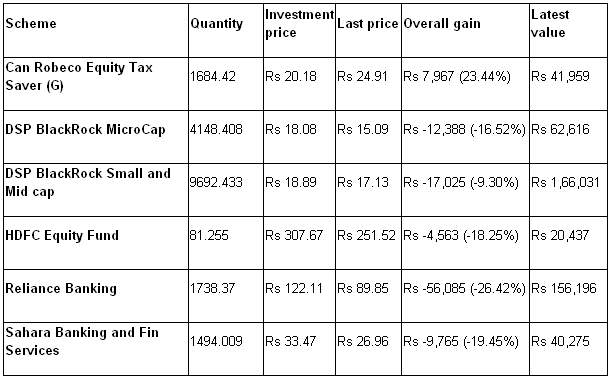
Learn how not to make losses by learning your money lesson from mutual fund portfolio of an investor.
Mutual funds as investment instruments are for investors who are willing to give time for their invested money to grow. It isn't an investment instrument to make you wealthy overnight but will lead to wealth creation over a long run.
'Patience' is the key word while investing in mutual funds. With mutual funds, you diversify across various companies that are part of mutual fund portfolio and thus lowers the risk. Fund manager takes a call on which sectors have growth potential in future and which sectors will be laggards in coming years. This is a positive because most investors do not have the time or the expertise in the investment area. Mutual funds continue to be an excellent option, for small investors.
In spite of all the above points, investors still tend to invest in the funds not in line with their risk profile and also for comparatively lesser duration looking to make hefty profits quickly. More often than not, they end up losing money in the process.
Click NEXT for more
Courtesy: Investment-Mantra.in

Today we evaluate portfolio of one such investor and try to evaluate what loopholes you as an investor should avoid while investing in mutual funds:
Note: The portfolio here is for evaluation purpose only.
Indeed you can make out that this particular investor in spite of making majority of investments (lump sum) in 2007 is still in deep losses.
For instance, the overall gain made by this investor in Canara Robeco Tax Saver (Growth) fund is: 1,684.420 X (24.91 minus 20.18 = 4.73) = Rs 7,967.3066
Similarly, the loss made by this investor in DSP BlackRock MicroCap is: 4,148 X (18.08 minus 15.09 = minus 2.99) = Rs 12, 388.
So, why do you think this investor lost money?

Click NEXT to read more

Avoid investing a lump sum amount
The first significant thing which this investor could have avoided was to invest all of his money lump sum. Most of the investments were made in November 2007. So as a result he didn't enjoy the benefit of cost average over time. This is where the power of SIP comes into picture.
Avoid investing lump sum amount in mutual fund. Instead invest in a staggered manner using systematic investment plan. Discipline and commitment are the buzzwords while investing in mutual funds through SIPs.
Click NEXT for more

Follow a defined investment strategy
A definitive investment strategy is missing here. Funds have been chosen randomly with no proper allocation to pure large cap funds, large cap oriented funds, large and mid cap funds, mid and small cap funds. Ideally investor should invest 65-70% in large cap or large cap oriented funds, 15-20% in small and mid cap fund and close to 10% in exposure to gold or thematic funds can be taken.
Of course allocation can depend on investor risk profile, investment horizon but taking undue risk won't be a smart thing to do. High risk doesn't guarantee high returns. A good mutual fund is one that gives better returns than others for the same kind of risk taken.
Investor doesn't have a quality pure large cap fund or balanced fund in the portfolio. Make sure you start with a balanced fund or a well-diversified equity fund with good track record across all market cycles. Once you have good core portfolio in place, you can look towards small and mid cap funds, sectoral funds.
Click NEXT for more

Review your portfolio every 6-8 months
The other mistake this investor made was not to review his investment periodically. He could have taken a hint from performance of some of the funds year on year and could have done away with the laggards. So actively managing your portfolio is very significant as fund doing well today can be a laggard 2-3 years down the line.
So investors should actively manage their portfolio. Do not get emotionally attached to any investment. Be coldly rational if it's not working for you; dump it (make sure you monitor its performance consistently and compare it with benchmark for couple of quarters).
On the other hand, don't let brief periods of underperformance push you to make impulsive sell decisions. The biggest error an investor can make is to be impulsive and act in haste.
Go with funds that have been consistent performers in all market conditions, especially their ability to limit losses in market downturn.
Click NEXT for more

Restrict your exposure to sectoral funds
Evaluate your risk profile before investing in sectoral/thematic funds as they tend to be more volatile then equity diversified schemes. Having exposure to two banking funds could have been avoided by this investor, especially in absence of a quality diversified equity schemes.
Allocation to sectoral funds should ideally be restricted to 10% even for high-risk profile investors. Investing through SIP in sectoral fund such as Reliance Banking Fund would have given him a return of close to 20% CAGR against his current loss of 26%.
Investing through SIP also makes sense for sectoral funds too as does for other equity diversified schemes. Unless you have a strong thesis on why a sector or thematic fund must be in your portfolio, avoid such investments. If you have already invested in such funds but find them cluttering your portfolio, consider exiting.
Taking limited exposure to pharma fund could have made more sense since most of diversified funds have limited exposure to pharma sector. This fund is relative less volatile too.
Restrict number of funds in your portfolio:
Too many funds in the portfolio didn't help the investor either. An investor should ideally try to keep not more than 5-6 funds in his/her portfolio so as to actively track it.
Evaluate need to take assistance of a financial planner:
Take help of financial planner if required. More often than not investors are willing to take a big gamble of their own without complete knowledge of pros and cons of financial products they are investing in but are adamant to hire a financial planner just thinking his commission as a big cost. More often than not, advice from reputed financial planners can help you avoid grave financial mistakes which can have long lasting impact on your finances.
Click NEXT for more

Take exposure to gold
Investor could have evaluated option to take limited exposure to gold in form of gold ETF or gold fund thus diversifying across commodities too.
The toughest part in making an investment decision is selecting the right product be its mutual fund schemes, stocks or commodities. Remember consistency is the key with mutual funds.
Take exposure to a balanced fund
Most of investors believe that balanced fund tend to under-perform equity diversified schemes in long run. However if you invest in good quality balanced funds with good track record such as HDFC Prudence, HDFC Balanced -- your returns over 3-5 year period would have been very much comparable with equity diversified schemes.
Conclusion
While there is no dearth of good mutual funds in the market today, building a portfolio depends on preferences and objectives of each individual. The factors that come into play include age of the investor, risk appetite, time at hand to let investment grow, need for money- immediate or later -- and more importantly, the purpose of making such an investment.
Investors should evaluate their risk profile and invest accordingly. Following a simple and consistent investment strategy of investing in good funds with consistent track record can be a correct approach.